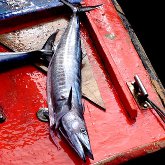All New TV Series "Wicked Tuna"
April 1, 2012Atlantic Highly Migratory Species News
April 5, 2012Have you ever fished for (or caught an) Amberjack? Would it surprise you to learn that this fish is not actually one fish, but rather three species of Atlantic fish in the Carangidae family? These are the greater amberjack, the lesser amberjack, and the banded rudderfish – all of which are fairly easy to tell apart on the end of your line.
Greater amberjacks have dark stripes that extend from the nose to the dorsal fin and no scutes. Lesser amberjacks have a proportionally larger eye and deeper body, and may have a dark band extending upward from the eyes. Banded rudderfish are sometimes mistaken for pilotfish because they have similar vertical bands, but can be distinguished by the presence of a dorsal fin.
What else should you know about this interesting fish?
- Amberjack are thought to spawn offshore throughout most of the year.
- Sometimes called AJs, these fish are typically caught unexpectedly and inadvertently by anglers dropping lines for barracuda, tuna, or shark. It’s not uncommon for anglers to toss amberjacks back or to give them away at the dock.
- Some anglers consider amberjack good eating. Others think amberjack is pretty vile. If you do plan to keep and eat this fish, discard the first few inches from the tail section because it’s likely contaminated with worms. Still with us? Remove the blood line and blacken amberjack on the grill for some good eating.
- Greater amberjacks like rocky reefs, bridges, shipwrecks, and areas of debris, and are sometimes caught near shore around south Florida. Lesser amberjacks prefer deeper water than other jacks.
- The strong and rebellious amberjack is a well-regarded game fish for the fight it gives. Many an angler doing battle with a jack has walked away from the encounter with a busted line.
- Amberjacks are typically voracious predators, and will feed on squid, fish, and some crustaceans. Live bait is the first choice of most anglers fishing for AJs.

